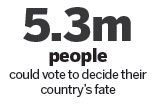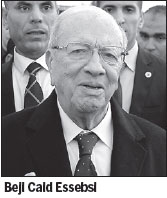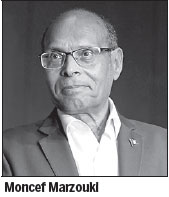Tunisian polls open for historic runoff
Polling started in Tunisia on Sunday in a landmark runoff to choose the country's first president nearly four years after the political and social turmoil of late 2010 and early 2011.
More than 5.3 million Tunisians will have the opportunity to decide their country's fate by choosing between two candidates, the leader of the anti-Islamist Nidaa Tounes party, Beji Caid Essebsi, and incumbent President Moncef Marzouki from an alliance with the moderate Islamist movement Ennahda.
Essebsi won the first round with 39.46 percent of the votes, while Marzouki was close with 33.43 percent.
Tunisians abroad started voting on Thursday and will continue until early on Monday morning.
Preliminary results of the second round of voting were scheduled to be announced on Monday evening, according to the Elections Board.
The vote is the first free presidential election since the country's independence from France in 1956.
Jihad threat
It is also the country's third in as many months, after Nidaa Tounes won an October parliamentary election, making Essebsi the favorite to be the next president.
The final result is expected to be announced between Monday and Wednesday.
Ahead of the landmark second-round vote, which sets Tunisia apart from the regional turmoil, jihadists issued a videotaped threat against the North African state's political establishment.
In an Internet video posted on Dec 17, jihadists claimed responsibility for the 2013 murders of two secular politicians that plunged Tunisia into crisis, and warned of more killings of politicians and security forces.
Last year's murders had threatened to derail Tunisia's political transition until a compromise government was formed in January.
The authorities have deployed tens of thousands of troops and police to guarantee security on Sunday.

Due to security measures, voting is limited from 10 am to 3 pm at 124 polling centers in three governorates near the Algerian border.
In addition to the jihadist threat, Tunisia faces major challenges.
Its economy is struggling to recover from the upheaval of the revolution, and there are also fears of widespread joblessness causing social unrest.
The International Crisis Group think tank has said Tunisia was the "last hope" in the region for a peaceful political transition, setting it apart from other countries such as Libya and Egypt.
"In the context of the meager harvest of the Arab Spring, Tunisia remains the last hope for a successful democratic transition," it said.
"The country and its allies have every reason to ensure that Tunisia continues on its exceptional course."
Xinhua - Reuters


(China Daily 12/22/2014 page11)














